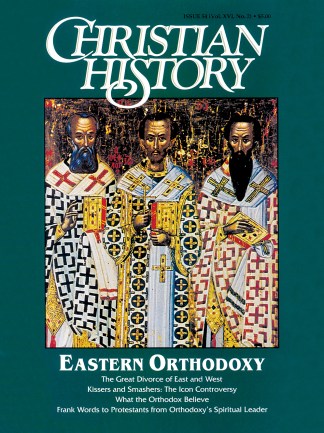Jesus Christ promised to send the Holy Spirit to guide the Church “into all truth” (John 16:13). According to the Orthodox, this promise finds its most complete fulfillment in the ecumenical councils.
At ecumenical (from the Greek word for “worldwide”) councils, bishops and clergy from across the church gathered to produce two types of rulings. Canons deal with administrative matters and can be changed by later councils. Horoi, doctrinal formulations, cannot; they permanently express authentic Orthodox teaching.
Through the centuries, Orthodox leaders have gathered in dozens of councils to discuss doctrine and practice. But the Orthodox believe there have been only seven truly ecumenical councils. Here are the main theological teachings and some sample canons passed by each council.
1. Nicea (325)
- 318 bishops
- Opposed the teaching of Arius by affirming that Jesus Christ is fully divine.
- Issued the first version of the Nicene Creed.
- Passed 85 canons: Rome is the first see of Christendom; various restrictions are to be placed on Christians who denied the faith under persecution; prayer should be offered standing.
2. Constantinople (381)
- 150 bishops
- Affirmed the divinity of the Holy Spirit, thus formulating the doctrine of the Holy Trinity: One God in three persons (hypostases), Father, Son and Holy Spirit.
- Completed final version of Nicene Creed (also called the Niceno-Constantinopolitan Creed).
- Passed seven canons: bishops should not interfere in matters of other dioceses; the bishop of Constantinople is second only to Rome.
3. Ephesus (431)
- 200 bishops
- Rejected the teaching of Nestorius, affirming that Jesus Christ was one person with two natures.
- Declared Mary the Theotokos, “Birthgiver of God.”
- Passed eight canons: bishops deposed by Nestorian bishops are to be reinstated; it is forbidden to alter the Nicene Creed.
4. Chalcedon (451)
- 630 bishops
- Opposed monophysite views, which held that the divine nature of Jesus Christ overwhelmed his human nature. Taught that the divine and human in Christ were united without confusion, change, division, or separation.
- Passed 30 canons: clergy and monks forbidden from involvement in business or the military; women cannot be ordained deaconesses before the age of 40; priests and deacons are not permitted to seize the material goods of their bishop once he dies.
5. Constantinople II (553)
- 165 bishops
- In light of continuing controversies about the person of Christ, it re-affirmed the teachings of the previous ecumenical councils regarding Jesus Christ and the Holy Spirit.
- No canons passed.
6. Constantinople III (680)
- 170 bishops
- Opposed the monothelete (single divine will) teaching about Christ, and affirmed that Jesus Christ had both full human and divine wills, united harmoniously under the leadership of the divine will.
- No canons passed.
5. & 6. Quinisext Council (692)
- 327 bishops
- Also known as the Council in Trullo because it was held in the trullus, or domed room of the emperor’s palace in Constantinople.
- It is viewed as an extension of the Fifth-Sixth Ecumenical Councils, thus the name.
- Passed 102 canons: obligatory clerical celibacy condemned; Saturday fasting during Lent forbidden.
7. Nicea II (787)
- 367 bishops
- Held in the midst of the more-than-century-long icon controversy (725-842). Concluded that only God can be worshiped, but icons can be honored as a means of expressing devotion to what was depicted in them.
- Passed 22 canons: bishops, priests, and deacons cannot be appointed by secular authorities; women cannot stay in bishops’ houses or men’s monasteries.
Stanley Harakas is emeritus professor of theology at Holy Cross Greek Orthodox School of Theology, Brookline, Massachusetts. He is author of Of Life and Salvation (Light and Life, 1996).
Copyright © 1997 by the author or Christianity Today/Christian History magazine. Click here for reprint information on Christian History.










